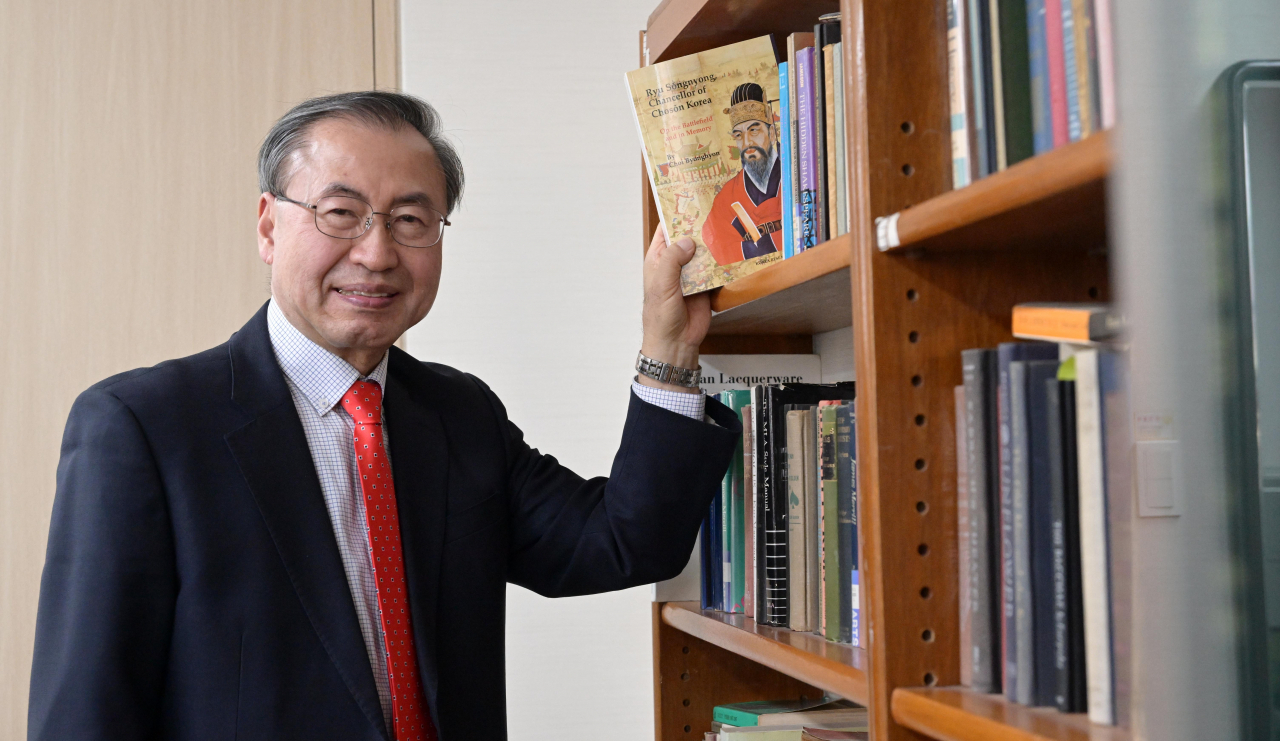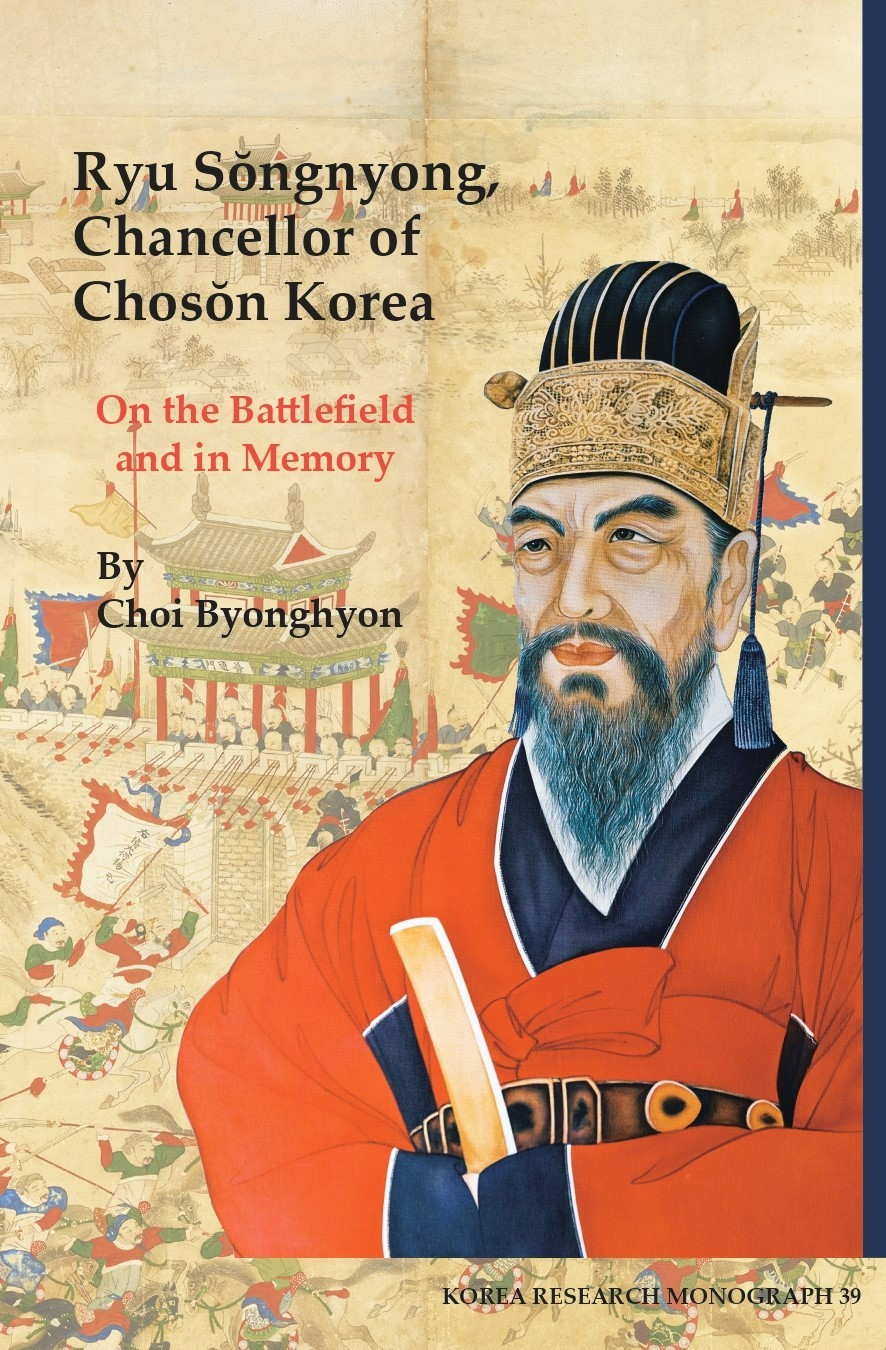[Herald Interview] First English biography of Imjin War's hidden hero published
Trailblazing translator of Korean classics turns to writing biographies of Korean heroes in English
By Hwang Dong-heePublished : March 5, 2023 - 16:43

Standing tall at Gwanghwamun Square in central Seoul is a statue of Adm. Yi Sun-shin, one of the most celebrated figures in Korean history, a national hero who prevailed over the Japanese invaders during the Imjin War (1592-1598).
Yi didn’t start his career in the Navy. He was serving in the Army when he was stripped of his rank by adversaries who were jealous of his talent. But 14 months before Japan invaded Korea in 1592, Yi was appointed commander of the Left Jeolla Naval District.
It was Yi’s childhood friend, Ryu Song-nyong, a scholar who served as the chief state chancellor, who recommended Yi to the post.
Revisiting Ryu is Choi Byong-hyon whose English biography titled “Ryu Songnyong, Chancellor of Choson Korea: On the Battlefield and in Memory” was recently published by the University of California, Berkeley as part of the Korea Research Monograph series at the university's Center for Korean Studies.
Choi, a former English professor and one of the foremost translators of Korean classics, is the director of the Center for Globalizing Korean Classics.
The 560-page biography, the first of its kind, sheds new light on “the preeminent statesman, astute military strategist and accomplished scholar” who foresaw the Japanese military's intent to subjugate the Korean Peninsula and strategically assigned the appropriate officers and troops as needed.

“Readers may wonder in what sense Ryu was heroic,” said Choi during an interview with The Korea Herald in February.
“Generally speaking, in East Asia, heroism refers not to warriors but scholars. In other words, they are 'cultural heroes,’” he said.
“Western heroes such as Achilles, Odysseus, Caesar and Napoleon were warriors who fought for fame and honor. In contrast, in the East, classic poetry sings of the virtues of sage rulers and scholars.”
Choi sees the Imjin War as a clash between the brush and the sword.
“Japan took the sword, unusual for Asian tradition. And Joseon fought with the brush. At first, the brush was helpless but it eventually prevailed,” he said.
"Ryu epitomizes the Eastern tradition of heroes."
The biography took seven years to complete, coincidentally equaling the length of the Imjin War.
Choi said the writing process turned out to be his own Imjin War. Not many records remain about Ryu’s life, especially his formative years.
“I had to believe that one can tell the tree by the fruit it bears. But I often felt as though I was sketching a likeness by tracing shadows cast on the wall,” said Choi.
Nevertheless, he is confident that he has come close to representing the mind and spirit of the hero.
Choi read and reviewed all the texts that Ryu might have read, studied Ryu’s contemporaries, even Ming China’s generals and envoys with whom Ryu interacted.
In fact, the book became much more than a biography -- exploring Joseon's rich history, politics and society so that the life of the hero can be seen from a broader perspective.
“I believe, much like his book ‘Jingbirok,’ Ryu’s life and insights would also inspire foreign readers,” said Choi. “Seonjo was the king but Ryu was the leader.”

For more than three decades, Choi has devoted himself to translating some notable Korean texts.
His English translated works of classical tomes include Ryu's “Jingbirok,” published in 2002 as “The Book of Corrections: Reflections on the National Crisis during the Japanese Invasion of Korea, 1592-1598”; Chung Yak-yong's “Mongmin Simseo,” published as “Admonitions on Governing the People: Manual for All Administrators” in 2010; “Taejo Sillok,” published as “The Annals of King Taejo: Founder of Korea’s Choson Dynasty” in 2014; and Park Je-ga's “Bukhakui” published as “A Korean Scholar’s Rude Awakening in Qing China: Park Chega’s Discourse on Northern Learning” in 2019.
“History repeats itself,” said Choi, recalling why he set off on the course of translating old classics.
“The books tell the leaders’ wisdom in times of national crisis and hold lessons for future generations.”
"All wars are fought twice, on the battlefield and in memory,” said Choi quoting Pulitzer-winning Viet Thanh Nguyen.
“Indeed, Ryu fought twice -- he led the Imjin War as the supreme surveillance commissioner, and he wrote a war memoir making memory another battleground.”
Ryu's records were intended to admonish future generations not to repeat the same mistakes.
“The admonitions in 'Jingbirok' are still relevant to our times and to people all around the world because the mistakes the book warns about could be made by anyone, anytime and anywhere. The current Russian invasion of Ukraine is a telling example,” said Choi.
With the biography of Seo, Choi switched from translating texts for the global audience to globalizing historical figures.
Choi's next biography may be on Chung Yak-yong, a philosopher and government official. Choi's translation of Chung's “Mongmin Simseo” was published in 2010. He is also thinking of King Sejong the Great as the subject of his next biography.
“Korea has quite a few historical figures who are on par with -- or sometimes even greater than -- those that are better known globally,” said Choi.
“The reason many great Korean historical figures are still unknown to the world is the lack of their biographies written in English. Time has come to remedy this,” said Choi.





![[From the Scene] Monks, Buddhists hail return of remains of Buddhas](http://res.heraldm.com/phpwas/restmb_idxmake.php?idx=644&simg=/content/image/2024/04/19/20240419050617_0.jpg&u=20240419175937)





![[Graphic News] French bulldog most popular breed in US, Maltese most popular in Korea](http://res.heraldm.com/phpwas/restmb_idxmake.php?idx=644&simg=/content/image/2024/04/18/20240418050864_0.gif&u=)



![[From the Scene] Monks, Buddhists hail return of remains of Buddhas](http://res.heraldm.com/phpwas/restmb_idxmake.php?idx=652&simg=/content/image/2024/04/19/20240419050617_0.jpg&u=20240419175937)

![[KH Explains] Hyundai's full hybrid edge to pay off amid slow transition to pure EVs](http://res.heraldm.com/phpwas/restmb_idxmake.php?idx=652&simg=/content/image/2024/04/18/20240418050645_0.jpg&u=20240419100350)

![[Today’s K-pop] Illit drops debut single remix](http://res.heraldm.com/phpwas/restmb_idxmake.php?idx=642&simg=/content/image/2024/04/19/20240419050612_0.jpg&u=)